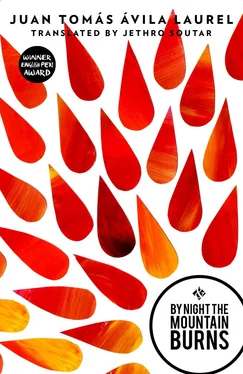Juan Ávila Laurel - By Night the Mountain Burns
Здесь есть возможность читать онлайн «Juan Ávila Laurel - By Night the Mountain Burns» весь текст электронной книги совершенно бесплатно (целиком полную версию без сокращений). В некоторых случаях можно слушать аудио, скачать через торрент в формате fb2 и присутствует краткое содержание. Год выпуска: 2014, Издательство: And Other Stories Publishing, Жанр: Современная проза, на английском языке. Описание произведения, (предисловие) а так же отзывы посетителей доступны на портале библиотеки ЛибКат.
- Название:By Night the Mountain Burns
- Автор:
- Издательство:And Other Stories Publishing
- Жанр:
- Год:2014
- ISBN:нет данных
- Рейтинг книги:5 / 5. Голосов: 1
-
Избранное:Добавить в избранное
- Отзывы:
-
Ваша оценка:
- 100
- 1
- 2
- 3
- 4
- 5
By Night the Mountain Burns: краткое содержание, описание и аннотация
Предлагаем к чтению аннотацию, описание, краткое содержание или предисловие (зависит от того, что написал сам автор книги «By Night the Mountain Burns»). Если вы не нашли необходимую информацию о книге — напишите в комментариях, мы постараемся отыскать её.
By Night the Mountain Burns — читать онлайн бесплатно полную книгу (весь текст) целиком
Ниже представлен текст книги, разбитый по страницам. Система сохранения места последней прочитанной страницы, позволяет с удобством читать онлайн бесплатно книгу «By Night the Mountain Burns», без необходимости каждый раз заново искать на чём Вы остановились. Поставьте закладку, и сможете в любой момент перейти на страницу, на которой закончили чтение.
Интервал:
Закладка:
‘ Dios mío , we got distracted,’ said the older sister.
‘We’re in trouble! We’re in big trouble … ’ added the younger one, putting her hands on her head, tears already surfacing.
What had happened? Well, while they were busy at work, bent at the waist, eyes glued to the ground, they’d not once stood up, and so they hadn’t realised that the fire they’d made around the base of that dried-out tree had spread, that it had burned through the dry leaves, dry twigs and dry grass under the tree and reached the next field, a field full of shrubs about three feet tall that were of no use to anybody but that were also dry at that time of year. The women’s eyes bulged and they started to scream. They knew they had to get out of there fast, not because they were in danger of getting burned, for they could still escape on foot, but because they knew they had set a calamity in motion. The ground in the field where the shrubs were was so stony that nobody on the island ever risked planting there, despite the fact that it was an area four or five times the size of any plot of farmland the women owned, farmland they inherited from their parents, specifically their mothers. Whenever anyone looked at that large area and thought about planting on it, they remembered that anything they raised above their heads, a hoe or a pick, or whatever name they gave to the tool they had, would meet stone as soon as it hit the ground, that in fact that whole area covered in shrubs was one giant rock. But the awful thing was that if that area caught fire, the flames would spread through it fast, skirt around the Pico and advance on the big village itself. And before that happened, assuming it didn’t go out for some lucky reason, the fire would raze all the neighbouring farmland for, as it made its way down towards sea level, it would meet pockets of earth where a few trees grew, and in among those trees were plots where women had planted to make the most of what opportunities there were in that oasis of rock. Too much effort had gone into tending those little plots for a fire to consume them before the women had reaped their rewards. So the two sisters would earn the wrath of all the women whose plots had been destroyed — and this before the worst of it for, after raging through the plantations, the fire would advance and seek lower ground, sea level. And sea level, in the direction the fire was travelling, meant the big village and everyone’s homes.
There was nothing those two sisters could do about the fire other than pray to the Señor on high that the wind didn’t pick up and fan the flames. The water in the lake below twinkled before their eyes. Water to put the fire out. But it was an optical illusion: what the naked eye couldn’t see was the impassable precipice. And if the precipice was impassable, carrying buckets of water out on people’s heads was simply unfeasible. Besides, there were no buckets anywhere on the mountain.
The sisters rushed to gather up what they’d harvested, loaded it on their heads and ran to get home. But the fire had already reached the edge of the path, so that if they tried to go back the way they’d come, they risked becoming surrounded. They probably wouldn’t have been surrounded and, even if they had, they probably wouldn’t have been incinerated, but the chance of it happening frightened them and it’s easy to imagine how, under the circumstances, without being able to see properly in the smoke, they weren’t thinking straight. Anyone in their position would have been afraid of the wind making matters worse by blowing in from the right, stoking the fire and forcing them to move off the path to the left. And with loads on their heads, panicked and unable to see properly, they didn’t know what lay off the path to the left — which in fact was nothing much — and they feared losing their footing and falling off the precipice, delivering their hard but young lives to Dios , and whoever else, down on the muddy banks of the lake.
So they retraced their steps in search of a different route. The safest option was a path on the edge of the precipice that skirted round the lake before descending on the other side, via countless steep steps, coming out by the main access point to the lake, the waters of which were useless to them. From there, the path ran in an almost straight line all the way to the big village. This was the path the sisters took, but it was a long journey. Therefore, by the time they reached the village, our village, the big village, their family had become very worried. Having seen the fire, they feared something terrible had happened and some of them had gone off in search of the two sisters, for on our island everybody knows how long it ought to take anyone to get anywhere. When they then saw the two sisters approaching from a totally different direction, they realised the situation could be about to get worse. However they were a long way from imagining how much worse: that in a few days’ time they’d experience the most significant and distressing moment of their lives. Nor could I imagine I was about to experience, albeit in someone else’s skin, the most significant and distressing moment of my life, my life on our quiet Atlantic Ocean island. And it wasn’t just significant and distressing, but an evil that wrapped its tentacles around so many people, including me. Around our lives.
The sun turned crimson, ready to take itself away to wherever it went at that time of day, and by now everyone’s eyes were fixed on the mountain. Everything else paled into insignificance as we watched the fire spread, a fire whose cause we still didn’t know. We had eyes only for that advancing fire, ears only for its crackle. And the fire went on advancing. The sun set and night awoke but we didn’t notice the stars in the sky, nor any other jewels up in the great canopy: our eyes were transfixed by the fire, our ears by the crackle of the dry branches as they burned. Many plantations were at risk but, as the fire spread, the real risk was to our lives. If it went on advancing as it was doing, there was a strong chance it would reach the houses on the edge of the big village, and from there it would rage through the village, a village where most of the houses were made of dry wood and jambab’u . Everything would burn to satisfy the fire. Whenever I’d seen fires before, fires nobody had provoked but that were impossible to put out, I’d been struck by how many things had to burn to satisfy the fire, to make it happy. And so we were all unhappy. Everyone was on tenterhooks. The mountain would burn, the fire would spread, our houses would burn to the ground and there was nothing we could do about it other than paddle out to sea in canoes and wait until everything had been consumed. And our family had it particularly bad because it was hard to imagine grandfather, the only man of the house, managing to find us a canoe and paddle us to safety. He didn’t have a canoe. I was only a child at the time but I could tell we couldn’t put the fire out by turning on all the street taps in the village and fetching buckets and buckets of water, and fetching buckets and buckets from the sea if there was no water in the taps. Child’s eyes they may have been, but I could tell the fire was big, really big, too big for us to fight, too big for us to extinguish and save ourselves from incineration. So the fire would push us out into the immensity of the deep blue sea, and it was night and we wouldn’t know what to do … Well, I just couldn’t see how we could all go out to sea in the middle of the night and not come to any harm so, as far as I was concerned, the fire had to burn itself out up there, on the slopes of the Pico, where it had started.
Night advanced and the fire advanced and we went upstairs to grandfather’s balcony. And there we saw that he was very worried too. So much so that the doors to the balcony were wide open and grandfather was on his feet the whole time we were up there. He watched the fire with a worried look on his face and he made no attempt to hide it. Maybe he thought the same as me: that if the fire penned us in, he wouldn’t be able to save us and we’d be the only ones in the whole village to perish. Doubtless I wasn’t thinking about the business of going out in canoes very clearly, for I’d always been nervous of the sea. But anyway, grandfather made frantic, worried gestures and, of course, seeing him so affected made us worry all the more. If he’d appeared calm before us, we’d probably have thought the whole thing was serious but nothing the adults couldn’t handle, the adults who weren’t like him.
Читать дальшеИнтервал:
Закладка:
Похожие книги на «By Night the Mountain Burns»
Представляем Вашему вниманию похожие книги на «By Night the Mountain Burns» списком для выбора. Мы отобрали схожую по названию и смыслу литературу в надежде предоставить читателям больше вариантов отыскать новые, интересные, ещё непрочитанные произведения.
Обсуждение, отзывы о книге «By Night the Mountain Burns» и просто собственные мнения читателей. Оставьте ваши комментарии, напишите, что Вы думаете о произведении, его смысле или главных героях. Укажите что конкретно понравилось, а что нет, и почему Вы так считаете.












